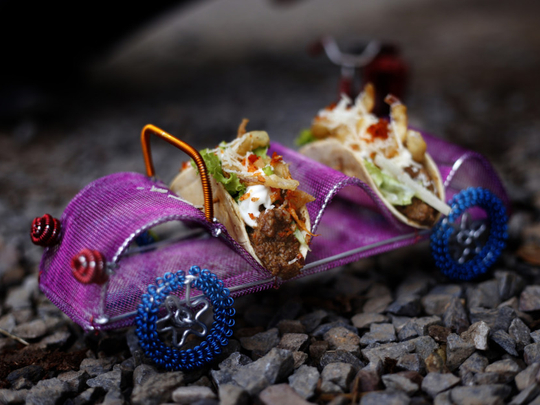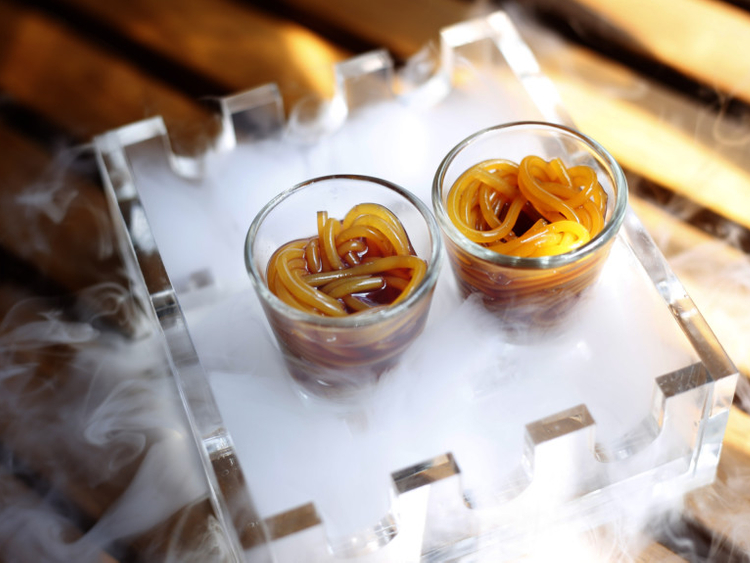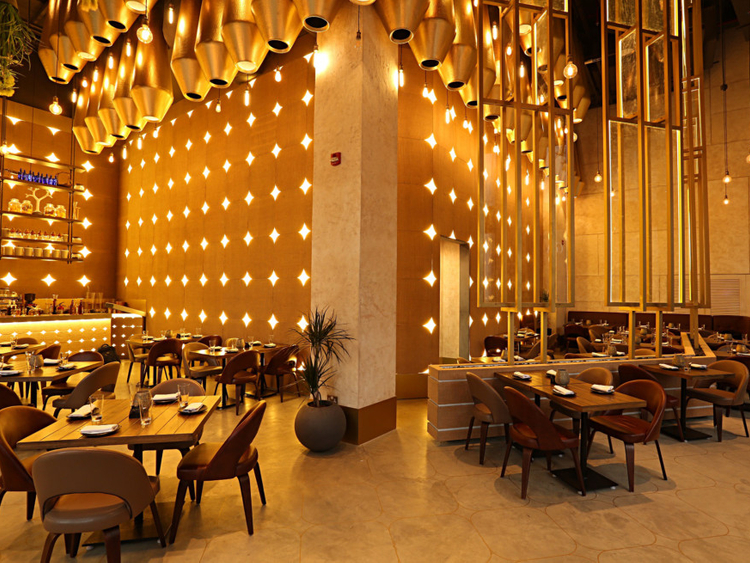
The fourth time I’ve went to Farzi Café was the first time I actually ate there. The Dubai outpost of the Indian chain opened its doors at City Walk in April, but it’s been close to impossible to get a table unless you book well in advance.
That extended success — unusual in an emirate known for its love of the latest — is probably due to a combination of factors: creative twists on classic recipes, the odd molecular classic, an exceptional variety of mocktails (it doesn’t serve alcohol), reasonable pricing, and it must be said, a careful management of its reservations list.
Although keen to rank Farzi Café alongside its molecular cousins Tresind and Jodhpur, I certainly dismissed the notion of a visit after five near misses in as many months. I couldn’t make it the first time chef Zorawar Kalra invited us, I didn’t book ahead on two other occasions and was turned away at the door, and another time the restaurant didn’t have a record of my reservation — although it had been confirmed.
Is anything worth that much effort? Can reality ever live up to expectations? After months of dithering, then, I asked the PR to score us a table for this review. (For our readers, we’ll put our stomachs to the taste test any time.)
Inside, it’s smaller than it seems, and the tables are tightly packed in, and they turn over quickly, but this does a lot to build bonds between diners and reinforce opinions. It also generates a buzz — when you do actually get a table, then, you’re more likely to savour the experience if it’s busy.
And it is worth savouring. A cooling yoghurt sphere topped with an aniseed berry compote does away with any preconceived notions of curry houses, but it’s the drinks that win the early points. Mine is a multi-layered masala iced tea, summer berry and ginger pick-me-up that is the perfect antidote to our insane heat, served out of a tea pot, while my friend has an Ananas Orbit, a pina colada broken up by pineapple caviar — it’s sweet and smoky, but not as cloying as usual.
For Indian diners, no meal is complete without rice and dal, and Kalra embraces the demand at the start, with an Italian-style Arancini of the classic savoury porridge or khichdi so beloved of comfort eaters on the subcontinent. A crisp, lentil coating beautifully offsets the gooey insides and to ramp up the flavour profile, they’re placed on a tomato coulis and topped with spicy mayo. One of Kalra’s signatures, they’re literally begging to be accompanied by a cold malt beverage. I know I’m going to try making them.
Since I’m being gluten-free (read difficult), my comfort-food starter is a stellar off-the-menu creation of curd rice, or thayir sadam, topped with prawns sautéed with pepper and curry leaves. The prawns are just done, a rarity in Indian restaurants, and pick up the spices beautifully, while the curd rice lends the dish a clean, elegant finish. So far, so good.
By now I want another drink, and after the success of the last round, I’m happy to go with the waiter’s recommendation of ice on fire, something the bartender brewed up a few days earlier. With a tamarind base and notes of rose and burnt citrus (orange oil is cleverly flambéed at the table and then dunked into the iced beverage), it’s the best mocktail I’ve had in a long while. It’s mellow, cooling and very perky indeed.
In typical style, we order a bunch of main courses, which are waiting for us at the table when we return from a cigarette break. The much-talked about Farzified biryani, with boneless lamb served espetada-style on an upright skewer, and surrounded by spiced rice, is a bit of a disappointment. The lamb has congealed a bit, and the spice leaves a rough finish, which the accompanying raita does little to clear. Proof indeed that Indian restaurants shouldn’t always be judged by their biryanis.
More successful is the chicken tikka masala, which comes to the table in a miniature red British telephone box — because it’s the UK’s national dish (It also fits very cleverly with the mall’s London-inspired theme). As you’d expect, the chicken is tender and smoky, and the gravy has a nice rustic texture, so it’s not overly creamy. (British expats clearly aren’t the target market here, as is reflected in the Emirati-Indian client profile.) My favourite, however, is a deconstructed Shepherd’s Pie. Chunks of wagyu beef in a pickled sauce sit atop a gorgeous velvety mash — anyone who’s ever crumbled chillies into this mince-and-mash classic will love this twist. Surprisingly, the spices don’t overpower the beef at all, and the result is truly stellar.
By this time we’re so stuffed we’ve barely any space for dessert, but we’re convinced to give it a go.
My gluten-free plate is a little disappointing partly because tableside gastro gymnastics with liquid nitrogen are rather commonplace now and partly because the flavours meld together but don’t stand on their own. On the menu as a risotto with phirni oxide, it’s an Eton-Mess style mix of frozen meringue, milk solids, nuts and a mawa crumble that’s left off because of the gluten. It’s a little heavy after our meal, so we don’t finish it, but I do go back to the sauce in my friend’s rasmalai tres leches, which she says is too pretty to eat. This classic Indian cheesecake is layered here with carrot halwa, another classic dessert, and it’s all topped with saffron milk, a caramel tree and dried rose petals. She says the caramel adds a nice crunch to the soft rasmalai, which, rather surprisingly, isn’t overpowered by the carrot. The saffron and rose flavours alternate beautifully through the sauce, and because it’s not overpoweringly sweet, I come back for more.
I will return to the restaurant — when the reservations ease up a little. While it won’t top Vineet Bhatia’s Indego in my book, Farzi Café is certainly a strong addition to the city’s Indian restaurant scene.













